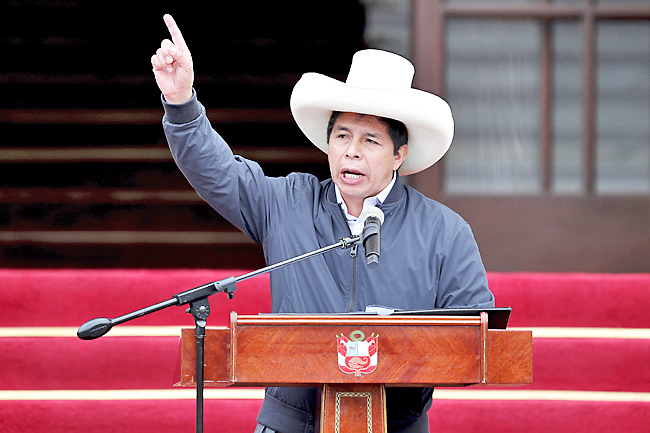LIMA, PERU (AP) – Peruvian President Pedro Castillo reshuffled his Cabinet again on Tuesday, making the third overhaul in his first six months in office amid criticism over his handling of issues like the fight against corruption.
Castillo replaced half of the 18 Cabinet members, including the prime minister and the ministers of finance, foreign relations and the environment as his administration deals with political sniping as well as an environmental disaster from an oil spill on Peru’s Pacific coast.
Considered the first peasant to become president of Peru, Castillo came to power in July promising to be a champion of the poor and to improve education, health care and other services, but he has struggled to find support from some political groups, including the ones represented in the Congress.
The latest political turmoil began last Friday when Interior Minister Avelino Guillén resigned, saying the president had not supported him to make changes in the police so authorities could more efficiently fight corruption and organised crime.
“What the government lacks is a direction, to define a direction,” Guillén said last Saturday.
On Monday, Prime Minister Mirtha Vásquez also quit while also saying that Castillo was not addressing corruption.

“We are really penetrated by corruption and it’s needed to take drastic decision to repair this situation,” she told RPP radio after her resignation.
Castillo said on Monday that he would name a new Cabinet, but he didn’t formally do it until Tuesday, the same day that Finance Minister Pedro Francke also resigned.
The president, who has said nothing about the criticism, named Héctor Valer as prime minister. Valer was elected as a lawmaker as part of Renovacion Popular, a far-right political party, although he later joined another group.
Óscar Graham, an economist who worked as financial market director at Peru’s central bank, was named finance minister.
More than a week ago, Peru’s government declared an environmental emergency after 21 beaches on its coast were contaminated by the January 15 spill of at least 11,900 barrels of oil from a refinery run by Spain-based Repsol.



















































